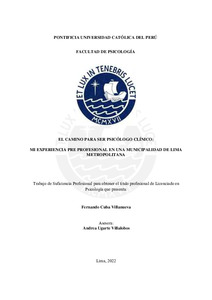| dc.contributor.advisor | Ugarte Villalobos, Andrea | |
| dc.contributor.author | Cuba Villanueva, Fernando | |
| dc.date.accessioned | 2022-07-21T18:47:33Z | |
| dc.date.available | 2022-07-21T18:47:33Z | |
| dc.date.created | 2022 | |
| dc.date.issued | 2022-07-21 | |
| dc.identifier.uri | http://hdl.handle.net/20.500.12404/22879 | |
| dc.description.abstract | A lo largo de mis prácticas pre-profesionales en una Municipalidad de Lima Metropolitana,
tuve la oportunidad de realizar diversas evaluaciones y acompañamientos psicológicos,
adaptados según las necesidades de los consultantes, lo cual permitió fortalecer las
competencias diagnostica e interviene. En primer lugar, durante las entrevistas iniciales se
exploraba el motivo de consulta, los detalles de las problemáticas centrales (historia del
síntoma) y se sugería una presunción diagnóstica. En segundo lugar, se diseñaba un proceso
de evaluación con objetivos que buscaban precisar el diagnóstico. Para lograrlo, se
profundizaba en determinadas áreas de la historia clínica y se tomaban pruebas psicométricas
y/o proyectivas. Finalmente, los resultados se integraban en un informe descriptivo y se
realizaba una devolución oral con el evaluado, señalando factores de protección, principales
áreas de conflicto y una serie de recomendaciones. Referente al eje interviene, el
acompañamiento se ofrecía a aquellos usuarios cuyos casos el/la supervisor/a considerara
podrían ser manejados por el practicante. Con ello, se aclaraba la naturaleza de la
intervención, así como los alcances y limitaciones de la misma. En esta fase, se trazaban
nuevos objetivos y se diseñaba un proceso apoyado en un modelo teórico-técnico pertinente.
Referente a la competencia evalúa, se han rescatado los elementos centrales del taller
efectuado en el curso Psicología y Violencia, dirigido hacia alumnos del 5to grado de
primaria. Este tuvo por finalidad reducir los fenómenos de violencia en el aula a partir de
fomentar la autorregulación emocional. El impacto fue estimado con los indicadores de logro
y se realizó un contraste con la bibliografía. | es_ES |
| dc.description.abstract | Throughout my pre-professional practices in one Municipality of Metropolitan Lima I had the
opportunity to carry out various evaluations and psychological accompaniments, adapted
according to the needs of the consultants, which allowed me to strengthen my diagnostic and
intervening skills. In the first place, during the initial interviews, the reason for consultation
and the details of the central problems (history of the symptom) were explored, and a
diagnostic presumption was suggested. Second, an evaluation process was designed with
objectives that sought to specify the diagnosis. To achieve this, certain areas of the medical
history were studied in depth and psychometric and / or projective tests were taken. Finally,
the results were integrated into a descriptive report and an oral feedback was made with the
evaluated person, pointing out protective factors, main areas of conflict and a series of
recommendations. For its part, support was offered to those users whose cases the supervisor
considered could be handled by the practitioner. With this, the nature of the intervention was
clarified, as well as its scope and limitations. In this phase, new objectives were outlined and
a process was designed based on a pertinent theoretical-technical model. Regarding the
competence evaluation, the central elements of the intervention carried out in the Psychology
and Violence course, aimed at students of the 5th grade of primary school, have been rescued.
The purpose of this was to reduce the phenomena of violence in the classroom by promoting
emotional self-regulation. The impact was estimated with the achievement indicators and a
contrast was made with the bibliography. | es_ES |
| dc.language.iso | spa | es_ES |
| dc.publisher | Pontificia Universidad Católica del Perú | es_ES |
| dc.rights | info:eu-repo/semantics/openAccess | es_ES |
| dc.rights | Atribución-NoComercial-SinDerivadas 2.5 Perú | * |
| dc.rights.uri | http://creativecommons.org/licenses/by-nc-nd/2.5/pe/ | * |
| dc.subject | Evaluación psicológica | es_ES |
| dc.subject | Psicología clínica | es_ES |
| dc.subject | Psicología--Prácticas profesionales | es_ES |
| dc.subject | Psicoterapia--Estudio de casos | es_ES |
| dc.title | El camino para ser psicólogo clínico: mi experiencia pre profesional en una municipalidad de Lima Metropolitana | es_ES |
| dc.type | info:eu-repo/semantics/bachelorThesis | es_ES |
| thesis.degree.name | Licenciado en Psicología | es_ES |
| thesis.degree.level | Título Profesional | es_ES |
| thesis.degree.grantor | Pontificia Universidad Católica del Perú. Facultad de Psicología | es_ES |
| thesis.degree.discipline | Psicología | es_ES |
| renati.advisor.dni | 45698892 | |
| renati.advisor.orcid | https://orcid.org/0000-0003-1157-6454 | es_ES |
| renati.author.dni | 70692639 | |
| renati.discipline | 313016 | es_ES |
| renati.juror | Custodio Espinoza, Elba Esperanza | es_ES |
| renati.juror | Mogrovejo Sanchez, Jose Amilcar | es_ES |
| renati.level | https://purl.org/pe-repo/renati/level#tituloProfesional | es_ES |
| renati.type | https://purl.org/pe-repo/renati/type#trabajoDeSuficienciaProfesional | es_ES |
| dc.publisher.country | PE | es_ES |
| dc.subject.ocde | https://purl.org/pe-repo/ocde/ford#5.01.00 | es_ES |






